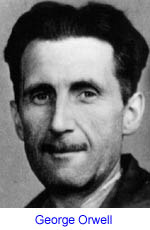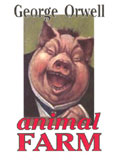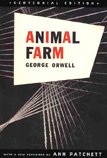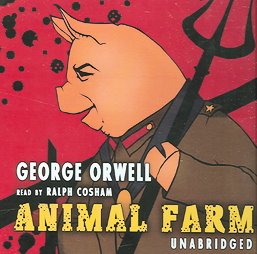
Book Review by Zinta Aistars
* Hardcover, 144 pages
* Publisher: Harcourt, 1990
* ISBN: 0151072558
* Price: $18.00
(Original publication, 1946)
It wasn't my first stay on the farm. I'd read Orwell as a girl, one with ethnic roots reaching back to the Baltic States (Latvia) then occupied by the Soviet Union, and so having grown up on stories of human cruelty and betrayal, of human nature gone corrupt when faced with the seduction of power -- all of that rather than the common, soothing fairy tale. For that reason, I surely understood it on a deeper level than most of my peers. I was fifteen the first of many times I visited the Soviet Union. And even though I had been born in the then freedom of the United States, I understood well enough that what I was witnessing was the essence of evil.

George Orwell was a socialist. With leanings towards Trotsky, perhaps an idealism that would be tested by the ugly reality of human nature, he did not stand where I stood in terms of ideology. I leaned more towards a laissez faire capitalism, a system never tested on this planet to this very day, but that did not detract from my enthusiasm for Animal Farm. On this barnyard, we saw eye to eye and snout to snout.

Animal Farm is a story as if written for a child, and yet, not. Its language is simple. But the adult aware of history and politics, of the ways of government out of control, fully recognizes the parallels Orwell intended with the Russian Revolution. His animal characters had human counterparts. Marx, Trotsky, Lenin, Stalin, all find their form here among pigs become men, or is it men become pigs. Guard dogs mimic KGB, hard working horses (Boxer) mimic the hardworking proletarians, tragically deluded. A farm of abused and overworked animals, often slaughtered when they have passed their prime as work animals, revolt against the farmer - mankind - surely the epitome of cruel animal. Alas, given such power as to run the farm themselves, the animals quickly shift into social classes delineated by power. Pigs rule, and with their rule comes privilege. To sustain privilege, the pigs change laws to their convenience and pleasure. The basic tenet of "All animals are equal" becomes "All animals are equal but some animals are more equal than others."

Orwell wrote about the Russian Revolution. And well he should, because it can be argued that the cruelty of that government has as yet not been fully understood by the "free world" even today. Yet the power and timelessness of this tale is that it can be applied to all governments when not held firmly within their checks and balances -- and frightening parallels can be witnessed in the current administration of the United States. I reread the book today with growing dis-ease. With all of our talk of superiority, our Patriot Acts and our eavesdropping, our acts of aggression and our collective amnesia surrounding the Geneva Act, there but for the grace of God go we...

No comments:
Post a Comment